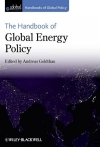| Title | Natural Gas Going Global? Potential and Pitfalls |
| Publication Type | Book Chapter |
| Authors | Goldthau, A., and M. Hulbert |
| Editors | Goldthau, A. |
| Book Title | Handbook of Global Energy Policy |
| Year | 2013 |
| Pages | 98-112 |
| Publisher | Wiley Blackwell |
| Place of Publication | London |
| Abstract | This chapter discusses the political and economic drivers behind the current transition in international gas markets, and sketches both contingencies characterizing this process as well as possible future scenarios. It argues that reduced OECD demand and unconventional gas production in the U.S. have fundamentally impacted on traditional pricing models based on oil-pegged long term contracts, particularly in Europe. On the demand side China will have a crucial role to play in determining future pricing models, whereas on the supply side future strategies of Russia and Qatar will be of importance. In addition, political and regulatory gas market risks in the U.S. and Europe may impact on future pricing models. The chapter finds that in the short run consumers may benefits from the current transition due to enhanced competition and greater diversification of supplies. There however also is a looming risk of greater supply side collusion. i.e. a potential ‘gas cartel’ in which producers coordinate prices and volumes. |

